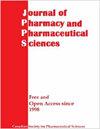山竹叶提取物总酚含量、次生代谢产物谱的测定及其在凉茶制剂中的潜在应用
IF 2.9
4区 医学
Q2 PHARMACOLOGY & PHARMACY
Journal of Pharmacy and Pharmaceutical Sciences
Pub Date : 2023-10-10
DOI:10.36490/journal-jps.com.v6i4.265
引用次数: 0
摘要
背景;山竹叶(Garcinia mangostana L.)具有次生代谢物,即酚类物质、类黄酮、单宁、皂苷和三萜。酚类物质是山竹叶中发现的最大的化合物群之一,具有多种药理和治疗功能,其中之一是抗癌。目标;测定山竹叶总酚含量、次生代谢产物及酚类提取物的种类。方法;用紫外-可见分光光度计测定没食子酸。利用LCMS分析次生代谢物和酚类物质类型。结果;经研究,总酚含量最高的部位为乙醇提取物96% (290.90 mg GAE/g提取物或29.08%),其次为乙酸乙酯提取物(161.07 mg GAE/g提取物或16.10%)。LCMS鉴定,共检出15种化合物,其中酚类化合物6种。发现的酚类化合物有没食子酸、苦杏仁素、橄榄苦苷、扁桃酸、香草酸和龙胆酸。结论;酚类化合物可以起到抗氧化剂的作用,保护人体细胞免受自由基引起的损伤,如退行性疾病,其中之一是由自由基诱导的癌症。本文章由计算机程序翻译,如有差异,请以英文原文为准。
Determination of Total Phenolic Content, Secondary Metabolite Profile from Mangosteen Leaf Extract and Its Potential Utilization in Herbal Tea Preparations as Anticancer
Background; Mangosteen leaves (Garcinia mangostana L.) have secondary metabolites, namely phenolics, flavonoids, tannins, saponins, and triterpenoids. Phenolics are one of the largest groups of compounds found in mangosteen leaves which have several pharmacological and therapeutic functions, one of which is anti-cancer. Objectives; To determine the total phenol content and profile of secondary metabolites and the type of phenolic extract of mangosteen leaves. Method; Using UV-Vis spectrophotometer Folin-Ciocalteu method with the gallic acid standard. Profile of secondary metabolites and phenolic types using LCMS. Results; Based on the research that has been done, the total phenolic content is obtained where the highest concentration is in the ethanol extract 96% (290.90 mg GAE/g extract or 29.08%), then ethyl acetate extract (161.07 mg GAE/g extract or 16, 10%). Identification of LCMS, detected 15 compounds, including 6 phenolic compounds. Phenolic compounds found were gallic acid, amarogentin, oleuropein glucoside, mandelic acid, vanillic acid, and gentisic acid.. Conclusion; Phenolic compounds can act as antioxidants by protecting body cells from damage caused by free radicals such as degenerative diseases, one of which is cancer due to free radical induction.
求助全文
通过发布文献求助,成功后即可免费获取论文全文。
去求助
来源期刊
CiteScore
6.90
自引率
0.00%
发文量
29
审稿时长
6-12 weeks
期刊介绍:
The Journal of Pharmacy and Pharmaceutical Sciences (JPPS) is the official journal of the Canadian Society for Pharmaceutical Sciences. JPPS is a broad-spectrum, peer-reviewed, international pharmaceutical journal circulated electronically via the World Wide Web. Subscription to JPPS is free of charge. Articles will appear individually as soon as they are accepted and are ready for circulation.

 求助内容:
求助内容: 应助结果提醒方式:
应助结果提醒方式:


